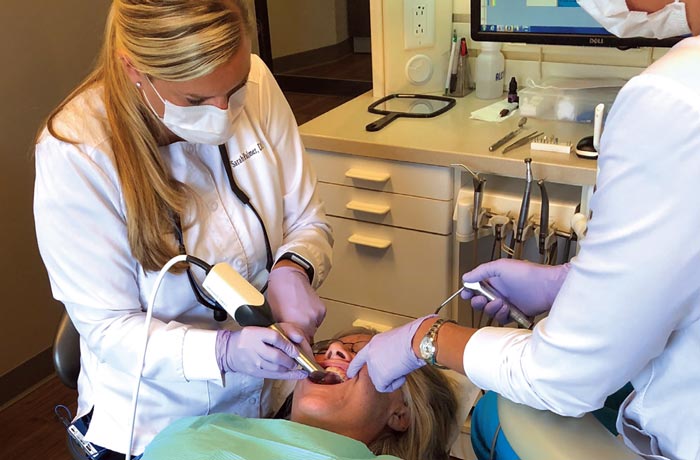What to Get out of Your First Visit to a Dentist in Eugene Oregon
What to Get out of Your First Visit to a Dentist in Eugene Oregon
Blog Article
An Overview to Common Dental Conditions That Call for a Dentist's Treatment
Understanding the variety of oral problems that require specialist treatment is extremely important for preserving optimum dental health. Toothaches, for example, can be symptomatic of severe issues such as cavities, split teeth, or abscesses, each needing specific interventions like fillings or root canals. Periodontal disease, from the very early stages of gingivitis to extra serious periodontitis, emphasizes the importance of regular dental check-ups and cleanings. Influenced wisdom teeth and jaw disorders can present substantial pain and issues. Making certain prompt sees to the dentist can alleviate these concerns efficiently, but just what are the therapies and indicators entailed?
Toothaches
Toothaches are a common dental problem that can range from mild discomfort to severe pain, typically indicating an underlying problem that calls for specialist focus. This discomfort can come from a selection of resources, including oral cavities, cracked or fractured teeth, and dental abscesses. Each of these problems poses considerable risks if left neglected, potentially bring about much more severe issues.
Tooth decays, also called caries, are triggered by the buildup of plaque that wears down tooth enamel, leading to holes or pits in the affected teeth. Split or fractured teeth, on the other hand, might result from injury, grinding, or biting right into tough items. These structural damages can subject the sensitive internal layers of the tooth, causing acute pain and boosting the threat of infection. Abscesses are painful infections at the origin of a tooth or between the gum and a tooth, normally resulting from severe decay or neglected tooth cavities.
Reliable treatment of toothaches involves resolving the root reason. This might include fillings for tooth cavities, crowns for cracked teeth, or root canals and anti-biotics for abscesses. Early treatment by a dental professional can prevent additional damage and alleviate pain, ensuring optimal dental health and wellness.
Gum Illness

The primary reason for gum disease is bacterial plaque, a sticky, anemic movie that frequently creates on teeth. Poor dental hygiene, smoking cigarettes, hereditary proneness, and particular medical conditions, such as diabetes mellitus, can intensify the risk of developing periodontal disease. Regular oral exams are critical for very early detection and management of this problem.
Therapy for gum tissue disease varies from professional dental cleansing and scaling to advanced treatments like origin planing and periodontal surgical treatment, relying on the severity. Preserving great oral health practices, including cleaning twice daily, flossing, and using a disinfectant mouthwash, can substantially reduce the threat of gum illness and promote much healthier gums.
Cavities
Tooth cavities, also referred to as cavities, are a typical dental problem identified by the damage of tooth enamel as a result of acid-producing bacteria in Get the facts the mouth. These germs thrive on sugars and starches from food and beverages, creating acids that gradually erode the enamel, causing cavity formation.
Early-stage cavities may disappoint signs, but as they proceed, they can trigger toothache, sensitivity to cool or warm, noticeable openings look at this site or pits in the teeth, and discoloration. If left without treatment, cavities can pass through deeper layers of the tooth, potentially resulting in extreme pain, infection, and even tooth loss.
Protecting against tooth cavities includes a mix of great dental hygiene methods and dietary habits. Normal cleaning with fluoride toothpaste, flossing, and routine oral exams are crucial. Dentists might also recommend additional safety nets, such as fluoride treatments and dental sealants, to protect teeth from degeneration.
Treatment for cavities depends on their seriousness. Small cavities can be addressed with dental fillings, which bring back the tooth's structure. Extra sophisticated situations might require crowns or perhaps origin canal therapy if the degeneration has actually gotten to the tooth's pulp. Timely intervention by a dentist is important to stop issues and keep overall dental health.
Impacted Wisdom Teeth
Affected knowledge teeth are a prevalent dental problem that happens when the third molars, typically described as wisdom teeth, fail to totally emerge or line up appropriately within the mouth. This condition commonly arises from inadequate space in the jaw or an unusual development angle of the teeth. Affected knowledge teeth can bring about a range of issues, consisting of damages, infection, and discomfort to surrounding teeth.
When wisdom teeth come to be impacted, they are usually partially appeared or remain completely under the periodontal line. This partial eruption can develop a pathway for germs to enter the gum tissues, causing infections that show up as swelling, discomfort, and also high temperature (dentists eugene). Furthermore, influenced wisdom teeth can put in pressure on bordering teeth, potentially causing crowding or shifting
A detailed oral assessment, generally entailing X-rays, is vital for diagnosing influenced wisdom teeth. Normal oral examinations are recommended to keep an eye on the problem and preserve oral health and wellness.
Jaw Conditions
Verdict

Oral cavities, additionally known as decays, are triggered by the accumulation of plaque that erodes tooth enamel, leading to holes or pits in the impacted teeth. Abscesses are painful infections at the origin of a tooth or in between the gum tissue and a tooth, typically resulting from extreme degeneration or untreated cavities.
Impacted wisdom teeth are a widespread oral problem that occurs when the third molars, commonly referred to as wisdom teeth, fail to fully emerge or align appropriately within the mouth. Influenced wisdom teeth can lead to a selection of difficulties, consisting of infection, pain, and damage to surrounding teeth.
In addition, impacted wisdom teeth can exert pressure on surrounding teeth, possibly triggering crowding or shifting.
Report this page